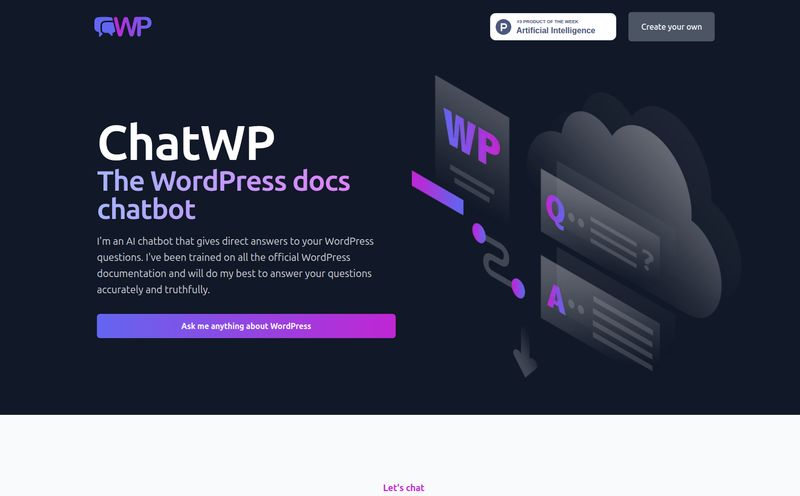Dealing with credit bureaus can feel like yelling into a void. You send a letter, you wait 30 days, you get a generic response saying they've "verified" the information... even when that information is obviously wrong. It’s a frustrating dance we've all done, and it usually feels like they’re leading. I’ve spent years in the SEO and traffic world, and I’ve seen countless “credit repair” services promise the moon. Most of them are just fancy templates and a prayer.
So when I heard about an AI-powered platform designed to fight this fight for you, my curiosity was definitely piqued. The platform is called DisputeAI, and it claims to use artificial intelligence to draft legally-sound dispute letters. It’s not just filling in blanks; it’s supposedly building a legal argument on your behalf. Honestly, my first attempt to check out their site was met with a security checkpoint wall—a classic sign of a modern tech stack, but a bit of a hiccup. Luckily, I got the scoop anyway.
But does it actually work, or is it just another gimmick in a long line of them? Let’s get into it.
What Exactly is DisputeAI? (And Why Should You Care?)
At its core, DisputeAI is a piece of legal technology built for the average person. Think of it less as a simple web form and more like a paralegal in your pocket. Its entire purpose is to help you challenge inaccuracies on your credit report, stop shady debt collector behavior, and enforce your rights under a whole alphabet soup of federal laws—the FCRA (Fair Credit Reporting Act), the FDCPA (Fair Debt Collection Practices Act), and regulations from the CFPB and FTC.

Visit DisputeAI
Why should you care? Because most of us don’t have a lawyer on retainer to write letters every time a collection agency misreports a debt. The credit dispute process is intentionally confusing and bureaucratic. It's designed to make you give up. A tool like DisputeAI aims to level the playing field by automating the most difficult part: the legal-ese and the procedural know-how. It’s for anyone who knows something is wrong with their report but doesn't know the specific statute to cite to get it fixed.
The Core Features: How DisputeAI Puts AI to Work
This isn't just about making a letter look official. The features here suggest a much deeper process. It’s not a one-trick pony, and that’s what caught my attention.
AI-Powered Legal Letter Generation
This is the main event. You input the details of your dispute, and the AI doesn't just slot them into a pre-written template. It analyzes your situation and generates a unique letter that cites the specific legal statutes you're protected by. For instance, if a debt is too old to be reported, it won't just say "this is old"; it will reference the specific FCRA provisions on obsolete information. This is a massive step up from the generic dispute letters you find floating around the internet.
Beyond Letters: Violation Detection and Tracking
Here’s where it gets interesting. DisputeAI claims it can actually detect violations. This could mean spotting procedural errors by the credit bureaus or identifying illegal tactics used by debt collectors. It also comes with a dashboard to track everything. You can see the status of your disputes, monitor your credit score for changes, and keep track of important deadlines. This turns a messy, paper-strewn process into a manageable project. It brings order to the chaos, which is half the battle.
More Than a Tool, It's an Education
I’m a big believer in empowerment. Giving someone a fish is fine, but teaching them to fish is better. DisputeAI seems to get this. The platform includes educational resources to help you understand your rights. By learning why a certain tactic works or what a certain law means, you're better equipped to handle your finances long-term. They even recommend legally-compliant credit building accounts, which shows they're thinking about the whole financial picture, not just deleting a few negative items.
The Big Question: Does It Actually Work?
Okay, let's talk results. DisputeAI boldly claims a 95% success rate for its dispute letters. In the world of marketing, big numbers like that always raise an eyebrow. But in the context of credit disputes, it's not entirely unbelievable. Why? Because a huge number of disputes are legitimate. The problem isn’t that people are wrong; it's that they don't frame their dispute in a way that legally compels the bureaus to act.
If the AI is correctly identifying errors and citing the correct law, it's essentially forcing the credit bureaus into a corner. They have a legal obligation to investigate and correct inaccuracies when presented properly. This tool is basically a legal crowbar. It uses the weight of established law to pry open a door that’s usually slammed in our faces. I’ve always felt that the best “credit repair” is simply forcing companies to follow the law. This tool seems built on that exact principle.
The Elephant in the Room: What Does DisputeAI Cost?
And here's the catch. Or, at least, a question mark. As of right now, I couldn't find a public pricing page for DisputeAI. This isn't uncommon for specialized software, but it's a bit of a pet peeve of mine. I like transparent pricing.
My guess is they operate on a subscription model, perhaps with different tiers based on the number of disputes you need or the level of support. It could be a monthly fee, or maybe a one-time charge for a certain period of access. The lack of clarity is a small red flag, as you have to engage with them to find out the cost. For a tool that promotes financial freedom, not having the price upfront feels a little... off.
Potential Pitfalls and Things to Consider
No tool is perfect, and it’s important to go in with your eyes open. Here are a few things to keep in mind:
- It's not a lawyer. For simple, clear-cut reporting errors, DisputeAI seems fantastic. But if your situation involves a complex lawsuit, active identity theft, or requires real legal advice, you still need to talk to a qualified attorney. This is a tool for enforcing rights, not for legal representation in court.
- Trusting the 'Black Box'. You are putting a degree of faith in the AI's output. While it's based on established law, you should always read the letters it generates to make sure they accurately reflect your situation. Don't just blindly hit 'send.'
- It Still Requires Your Effort. This is not a “set it and forget it” system. The platform generates the letters, but you are the one who needs to send them (I always recomend certified mail), track the responses, and provide follow-up information. It automates the hard part, not the whole thing.
My Final Take: Is DisputeAI Worth It?
So, what’s the verdict? From everything I’ve seen, DisputeAI looks like a genuinely powerful tool. It's a prime example of how AI can be used to democratize complex systems and put power back into the hands of consumers. It's not a magic wand that will instantly grant you an 850 credit score, but it is a formidable weapon for fighting back against errors, sloppy reporting, and illegal collection practices.
If you're someone who is frustrated with the credit dispute process, feels overwhelmed by the legal jargon, but is willing to be an active participant in your own financial recovery, DisputeAI could be an absolute game-changer. It bridges the gap between expensive credit repair companies and the often-ineffective DIY route. It just might be the high-tech ally you need to finally get your voice heard.
Frequently Asked Questions about DisputeAI
Is DisputeAI a legitimate credit repair company?
It's more accurate to call it a legal technology platform. Unlike a traditional credit repair organization (CRO) that manages the process for you, DisputeAI provides you with the AI-powered tools and knowledge to manage the dispute process yourself, directly enforcing your consumer rights.
Can DisputeAI guarantee my credit score will go up?
No, and you should be wary of any service that makes that guarantee. DisputeAI is designed to help you remove inaccurate, unfair, or unverified items from your credit report. Removing negative items will likely improve your score, but there's no way to promise a specific outcome or point increase.
Do I still have to mail the letters myself?
Most likely, yes. The platform generates the powerful, legally-compliant letters for you. You are still the one who needs to print, sign, and mail them to the credit bureaus and furnishers. For best results and a paper trail, always use certified mail with a return receipt.
How is DisputeAI better than free online templates?
Free templates are static and generic. DisputeAI is dynamic. It analyzes your specific situation to cite the relevant sections of the law, detects potential violations, and customizes the argument. A generic template is a peashooter; this is more like a guided missile.
What's the difference between the FCRA and FDCPA?
Think of it this way: The Fair Credit Reporting Act (FCRA) governs how your data is collected and reported by credit bureaus like Equifax, Experian, and TransUnion. The Fair Debt Collection Practices Act (FDCPA) governs how third-party debt collectors can behave when trying to collect a debt from you.
Reference and Sources
- Consumer Financial Protection Bureau (CFPB)
- Federal Trade Commission (FTC)
- Full Text of the Fair Credit Reporting Act (FCRA)
- Information on the Fair Debt Collection Practices Act (FDCPA)



